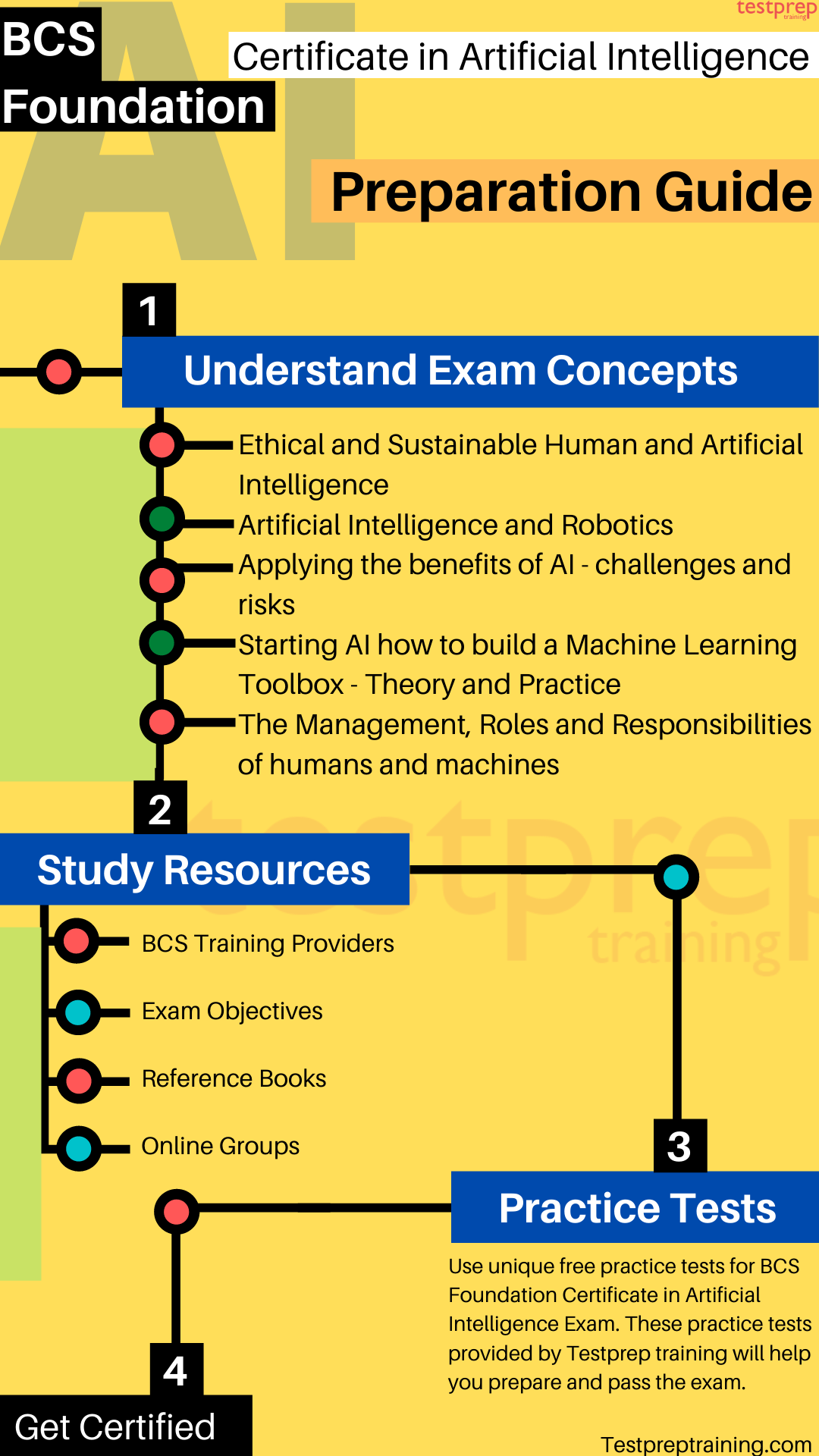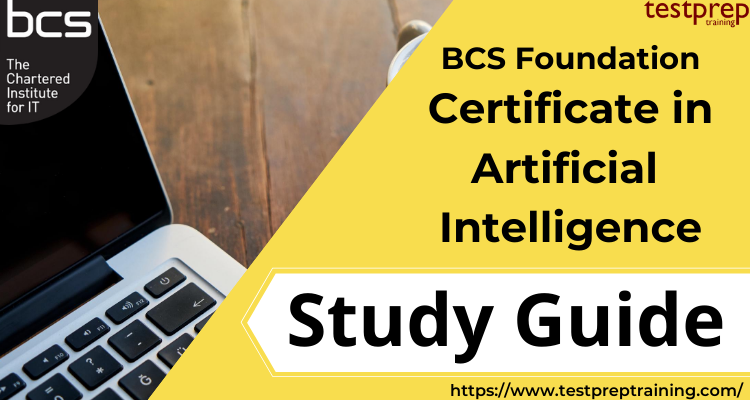Looking for a study guide to prepare for your BCS Foundation Certificate in Artificial Intelligence exam? Want to validate your skills with a professional certification? We are going to provide you with a comprehensive Study Guide with expert learning resources and step-by-step guide. Get ready to be equipped with all Advanced Learning resources to ace the exam. Moreover, this guide sets you on the right track in your journey towards this certification. But, before venturing on any journey, you should have a clear understanding of the exam and what it offers. With that being said lets first look at the exam details.
About BCS Foundation Certificate in Artificial Intelligence
Artificial Intelligence (AI) is a way to make machines learn and act like humans by copying human intelligence. The BCS Foundation Certificate in Artificial Intelligence checks if someone knows the words and basic ideas of AI. This certificate builds upon what’s taught in the BCS Essentials Certificate in AI, going into more detail and depth.
Key Exam Objectives
This exam is focused on covering the following key areas –
- Firstly, The potential benefits and challenges of Ethical and Sustainable Robust Artificial Intelligence
- Secondly, Basic process of Machine Learning (ML) – Building a Machine Learning Toolkit
- Thirdly, Challenges and risks associated with an AI project, and the future of AI and Humans in work.
Who should take the exam?
The BCS Foundation Certificate in Artificial Intelligence exam is designed for candidates in the following areas:
- Firstly, this certification is suitable for a variety of professionals, including engineers, scientists, change managers, architects, web developers, and more.
- Additionally, it’s a good fit for anyone interested in artificial intelligence within an organization, especially those in fields like science, engineering, finance, education, or IT services.
Study Guide for BCS Foundation Certificate in Artificial Intelligence Exam
How well you do in the exam depends on how well you prepare. To do really well, you should pick the right materials that match your style of learning and how much you already know. There are lots of resources available for preparing. The study guide below will explain the steps you should follow to make sure you do great in the exam.

Step 1- Review the Exam Objectives
During the exam preparation, it is good to understand and review every exam’s objectives. This will help candidates to easily get through the concepts and topics related to the exam. So, make sure you visit the Official website of BCS, to have a clear view. However, it is the most authentic site to provide any information regarding the BCS Foundation Certificate in Artificial Intelligence. This exam covers the following topics-
Topic 1: Ethical and Sustainable Human and Artificial Intelligence
Firstly, this domain covers recalling the general definition of Human and Artificial Intelligence (AI). Then, explaining what are Ethics and Trustworthy AI. Also, describing the three fundamental areas of sustainability and the United Nations seventeen sustainability goals. Further, describing how AI is part of ‘Universal Design,’ and ‘The Fourth Industrial Revolution’. Moreover, understanding that ML is a significant contribution to the growth of Artificial Intelligence.
Topic 2: Artificial Intelligence and Robotics
This domain includes concepts to demonstrate understanding of the AI intelligent agent description. Also, describing what a robot is and explaining what an intelligent robot is.
Topic 3: Applying the benefits of AI – challenges and risks
Further, this domain focuses on describing how sustainability relates to human-centric ethical AI and how our values will drive our use of AI will change humans, society and organisations. Then, explaining the benefits of Artificial Intelligence by. Also, describing the challenges of Artificial Intelligence. Furthermore, demonstrating understanding of the risks of AI project and listing opportunities for AI. Additionally, identifying a typical funding source for AI projects and relate to the NASA Technology Readiness Levels (TRLs).
Topic 4: Starting AI how to build a Machine Learning Toolbox – Theory and Practice
This domain aims at describing how we learn from data – functionality, software and hardware. Also, recalling which typical, narrow AI capability is useful in ML and AI agents’ functionality.
Topic 5: The Management, Roles and Responsibilities of humans and machines
Lastly, this domain includes the concepts for demonstrating an understanding that Artificial Intelligence (in particular, Machine Learning) will drive humans and machines to work together. Then, listing the future directions of humans and machines working together. Additionally, describing a ‘learning from experience’ Agile approach to projects
Step 2- Explore Study Resources
Getting through the exam can be simple if you have the right study materials. Make sure the materials are accurate and trustworthy. The resources you choose will make a big difference in how well you get ready and pass the exam. So, be careful when selecting them. Here are some highly recommended study materials you should use in your preparations.
Enrol for BCS Training Providers
BCS offers various training partners that provide courses and training programs for the certification exams. This training will help candidates to prepare for the exam they applied for and to get an accredited training course. However, the training will be of a minimum of 18 hours of study over a minimum of three days.
Choose the Relevant Reference Books

The BCS Accredited Training Organisations offer candidates BCS books and course materials. These books work as a reference for candidates to understand the exam more accurately. The books are divided into sections that are:
Recommended PRE-COURSE Reading
- Human + Machine – Reimagining Work in the Age of AI by Paul R. Daugherty and H. James Wilson.
Recommended POST-COURSE Reading
- Firstly, Ethics Guidelines for Trustworthy AI by High-Level Expert Group on Artificial Intelligence
- Secondly, Artificial Intelligence, A Modern Approach (3rd edition) by Stuart Russell and Peter Norvig
- Thirdly, Hands-On Machine Learning with Scikit-Learn and TensorFlow: Concepts, Tools, and Techniques to Build Intelligent Systems by Aurélien Géron
- Moreover, The Singularity is Near by Ray Kurzweil
- Further, The Fourth Industrial Revolution by Klaus Schwab
Additional Reading – Specialist Reference List
- To begin with, Linear Algebra and Learning from Data (1st edition) by Gilbert Strang
- Secondly, An Introduction to Linear Algebra (5th edition) by Gilbert Strang
- Thirdly, The Mystery of Consciousness by John R. Searle
- Moreover, Machine Learning by Tom Mitchell
- Subsequently, Life 3.0 by Max Tegmark
- Further, Sustainable Energy – without hot air by Sir David JC Mackay
- Then, Machine Learning – A Probabilistic Perspective by Kevin P. Murphy
- Additionally, Automated Planning Theory and Practice by Malik Ghallab, Dana Nau and Paolo Traverso
- Furthermore, The Cambridge Handbook of Artificial Intelligence by Keith Frankish and William Ramsey
- Also, Artificial Intelligence: 101 Things You Must Know Today About Our Future Author
Join Online Groups
During your exam preparation, it’s a good idea to become a part of study groups. These groups connect you with others who are preparing for the same exam. Here, you can have conversations about exam topics or ask questions. This way, you can get the most helpful answers to your questions. Plus, hearing different perspectives makes learning more interesting, and these discussions make your studies more complete.
Step 3 – Evaluate yourself with Practice tests
This is a crucial part that can enhance your exam preparation. In other words, practice tests are valuable because they show you where you’re strong and where you need improvement. So, by practicing, you can get better at answering questions, which will save you time during the real exam. Additionally, it’s best to try practice tests after finishing a whole topic, as this serves as a review. Solving practice tests can boost your confidence and reduce stress. Lets Start Practising Now!



